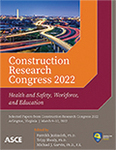Developing Context and Practice-Based Curricula in Construction Engineering and Management
Publication: Construction Research Congress 2022
ABSTRACT
The construction industry is looking for college graduates with leadership, communication skills, business acumen, and practical experience. Hence, a construction-related curriculum must provide students with opportunities to have real-world experience while working on their degree and have a culture of constant innovation in pedagogy to deliver theoretical-practical learning experiences. This paper systematizes the experience of developing a Construction Engineering and Management (CEM) track for the Civil Engineering undergraduate program at the University of Virginia (UVA). The track was developed with subject matter experts and executives from six construction companies and one design firm. With a renewed teaching-learning ecosystem, the track welcomes the missing actors, fits the industry needs, changes the traditional roles of professors and industry experts, and expands the classroom concept. The findings and lessons learned from this experience are relevant to civil and construction engineering programs seeking to improve existing curriculum or develop more context and practice-based curriculum.
Get full access to this article
View all available purchase options and get full access to this chapter.
REFERENCES
Abudayyeh, O., Russell, J., Johnston, D., and Rowings, J. (May 01, 2000). Construction Engineering and Management Undergraduate Education. Journal of Construction Engineering and Management, 126, 3, 169–175. DOI: https://doi.org/10.1061/(asce)0733-9364(2000)126:3(169).
Ahn, Y. H., Annie, R. P., and Kwon, H. (April 01, 2012). Key Competencies for US Construction Graduates: Industry Perspective. Journal of Professional Issues in Engineering Education and Practice, 138, 2, 123–130. DOI: https://doi.org/10.1061/(ASCE)EI.1943-5541.0000089.
Ahmed, S. M., Yaris, C., Farooqui, R. U., and Saqib, M. (October 02, 2014). Key Attributes and Skills for Curriculum Improvement for Undergraduate Construction Management Programs. International Journal of Construction Education and Research, 10, 4, 240–254. DOI: https://doi.org/10.1080/15578771.2014.900833.
Bank, L. C., Shapira, A., Russell, J. S., and Hanna, A. (September 01, 2007). Education in Construction Engineering and Management Built on Tradition: Blueprint for Tomorrow. Journal of Construction Engineering and Management, 133, 9, 661–668. DOI: https://doi.org/10.1061/(asce)0733-9364(2007)133:9(661).
Bruhl, J. C. (2020, June). Making Connections: Ensuring Strength of the Civil Engineering Curriculum Paper presented at 2020 ASEE Virtual Annual Conference Content Access, Virtual Online. https://doi.org/10.18260/1-2--34941.
Carbone, A., Rayner, G. M., Ye, J., and Durandet, Y. (January 01, 2020). Connecting curricula content with career context: the value of engineering industry site visits to students, academics, and industry. European Journal of Engineering Education, 45, 6, 971–984.
Clevenger, C., Brothers, H., and Abdallah, M. (2016). Early Development of an Interdisciplinary Construction Engineering Management Program. Construction Research Congress 2016: Old and New Construction Technologies Converge in Historic San Juan - Proceedings of the 2016 Construction Research Congress, CRC 2016 (2016) 47–57. DOI: https://doi.org/10.1061/9780784479827.006.
Hansen, M. (2021, May 21). The US Education System Isn’t Giving Students What Employers Need. Harvard Business Review. https://hbr.org/2021/05/the-u-s-education-system-isnt-giving-students-what-employers-need.
Guggemos, A. A., and Khattab, M. (2015, June). Beyond the Industry Advisory Board: Increasing the Role of Industry Engagement to Support Program Quality Paper presented at 2015 ASEE Annual Conference & Exposition, Seattle, Washington. DOI: https://doi.org/10.18260/p.23620.
Jara, H. O. (2014). La sistematización de experiencias: Práctica y teoría para otros mundos posibles. Lima. Programa Democracia y Transformación Global.
Johri, A., and Olds, B. M. (2014). Cambridge handbook of engineering education research. Chapter 3: Situative Frameworks for Engineering Learning Research. 47–66.
Mwafy, A. (2020). “Curriculum Development with a Global Perspective of an Established Master’s Program in Civil Engineering,” 2020 Advances in Science and Engineering Technology International Conferences (ASET), 2020, pp. 1–5, DOI: https://doi.org/10.1109/ASET48392.2020.9118318.
Porter, M. E. (January 01, 1996). What is strategy? Harvard Business Review, 74, 6.
Russell, J. S., and Stouffer, W. B. (January 01, 2003). CEM Faculty: A Leading Opportunity for the Civil Engineering Profession. Construction Research Congress 2003, 611–618. Reston, Va: American Society of Civil Engineers. DOI: https://doi.org/10.1061/40671(2003)73.
Schaufelberger, J. (2009). Construction business management. Upper Saddle River, NJ: Prentice Hall.
Turnbull, B. (2020). An industry-inspired civil engineering curriculum. Proceedings of the Institution of Civil Engineers – Civil Engineering 173(2): 91–95, DOI: https://doi.org/10.1680/jcien.19.00012.
Information & Authors
Information
Published In
History
Published online: Mar 7, 2022
Authors
Metrics & Citations
Metrics
Citations
Download citation
If you have the appropriate software installed, you can download article citation data to the citation manager of your choice. Simply select your manager software from the list below and click Download.
